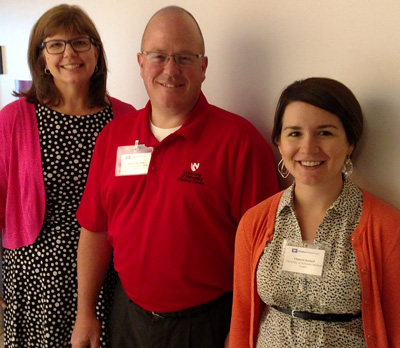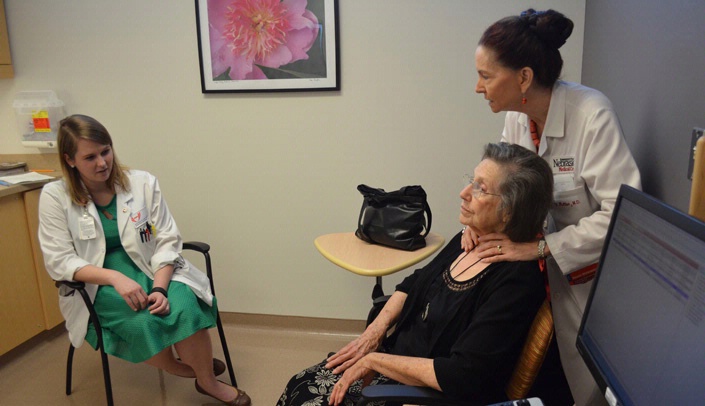It’s a STEPP by STEPP process.
On Sept. 17-18, UNMC held its seventh Team Strategies and Tools to Enhance Performance and Patient Safety (TeamSTEPPS) master training program, drawing participants from rural areas throughout the state, as well as Methodist Health System, Nebraska Medicine Emergency and Geriatrics departments, and Nebraska Medicine’s new patient safety officer.

Training course broadens UNMC’s expertise
Russ Buzalko, Ph.D. (pictured at center), of the College of Medicine, and Anne Skinner (at left) and Victoria Kennel (at right) of the College of Allied Health Professions recently attended a TeamSTEPPS Advanced Master Trainer course at Duke University in Chapel Hill, N.C.
The training put Kennel, Skinner and Dr. Buzalko on the highest tier of the TeamSTEPPS training process, as there are only 115 advanced master trainers in the United States. This select team constitutes three of approximately 115 advanced master trainers in the United States today.
“The advanced course focuses on TeamSTEPPS implementation throughout a large organization,” Dr. Buzalko said. “But we also discussed methods for sustainment.”
Prep work for the course involved reaching out to patient safety and quality colleagues at Nebraska Medicine.
“That was great because it increased our network and connections,” Dr. Buzalko said. “So we had to pull that information together, analyze it and look at areas where we have room for improvement — and see where we’re succeeding too.”
UNMC has trained more than 400 master trainers from 54 critical access hospitals in Nebraska in TeamSTEPPS since 2008, according to Anne Skinner, research associate. During training, master trainers learn team skills, how to teach and coach the skills, and develop a plan to spread the knowledge and skills in their hospital.
“TeamSTEPPS improves teamwork and communication,” said Victoria Kennel, an industrial/organizational psychologist in the College of Allied Health Professions and a TeamSTEPPS advanced master trainer. “It offers an evidence-based approach to support effective information exchange and interaction in teams.”
In a health care setting, the program can improve the performance of a health care team, ultimately improving patient care and safety, said Katherine Jones, Ph.D., associate professor and health services researcher in the College of Allied Health Professions.
“What does it take to be a high-functioning team?” Dr. Jones asked. “It takes the ability for leaders to bring people together. When people feel psychologically safe to share what they know about what’s going on around them, then they can seek and offer assistance as needed. The result is that the team is able to quickly adapt and learn in complex environments.”
Russ Buzalko, Ph.D., assistant professor of emergency medicine, said his military background left him familiar with a team-based approach. He noted that TeamSTEPPS is being implemented in health care organizations across the nation.
“As a person who relied on teamwork from another industry, I know its importance and can correlate how it affects patient safety,” he said. “Teamwork is vital to reducing and eliminating human error, and the better we are at it, the better chance we have of reducing errors and improving quality.”
Jane Potter, M.D., professor of internal medicine-geriatrics, has been using TeamSTEPPS in her clinic since 2011.
“The idea was to improve the quality of care we provided and to improve safety in our clinic, as well as develop tools for being more efficient and timely with our care,” Dr. Potter said.
By using the Medical Office Survey on Patient Safety Culture, Dr. Potter was able to determine that staff perceptions of teamwork, safety, and quality improved after the training.
“Also, by working in teams, we’ve become much more efficient,” she said. “We were able to double the number of outpatient visits we provided.”
